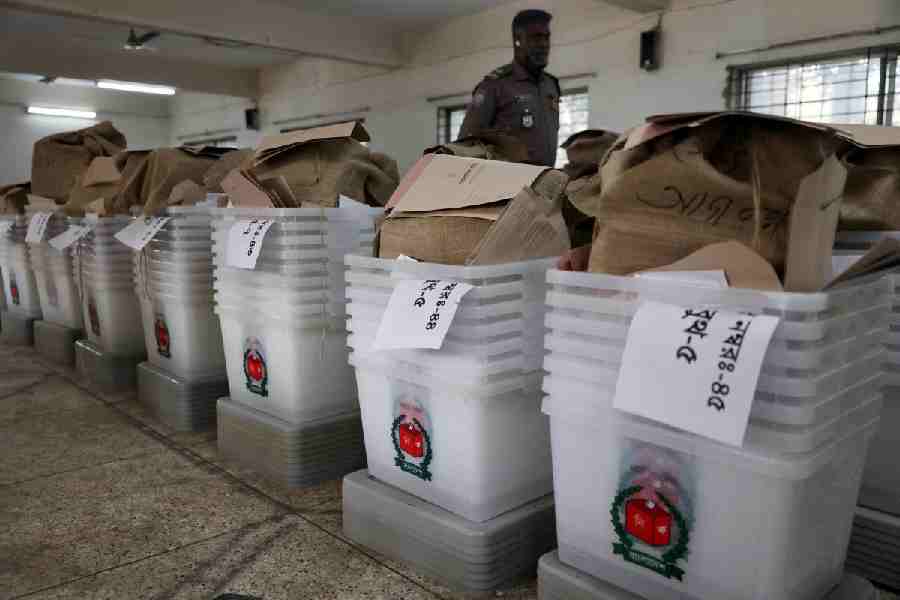New Delhi, Sept. 16: The Narendra Modi government has quietly buried a key legacy of the country's approach to the Non Aligned Movement (NAM), for the first time sending a delegation without India's foreign minister to the 120-member grouping's summit - with an excuse few are buying.
Vice-President Hamid Ansari is already filling in for Prime Minister Narendra Modi at the heads of government meeting of the NAM tomorrow on the picturesque Margarita Island off the northeastern coast of Venezuela, only the second time an Indian PM has avoided the summit.
But on Thursday evening, at the crucial ministerial meeting of the NAM that precedes the leaders' talks and where the outcomes of the summit are actually finalised, it was junior foreign minister M.J. Akbar who represented India.
Never before has India gone unrepresented at the cabinet level at the NAM, fundamentally a political movement that has emphasised executive participation - from heads of government and foreign ministers - rather than representation by holders of titular offices.
Even in 1979, when Havana hosted the NAM, and the then lame-duck Prime Minister Chaudhary Charan Singh skipped the summit, his foreign minister Shyam Nandan Prasad Mishra attended the meet. Charan Singh was the only previous Indian Prime Minister who did not attend the NAM summit.
The Modi administration has cited Sushma's health - she was hospitalised for a month this past summer - to Venezuela as the reason she can't attend the summit, senior officials familiar with the discussions have told The Telegraph.
India has also called off a planned visit to Mexico by Sushma this month, again indicating to that country that the foreign minister's health was the reason she will not be able to travel to Mexico City.
But Sushma will fly 16 hours to New York later this month for the UN General Assembly, and those who wanted to host her, and diplomats from other NAM nations are wondering why a further, five hour flight to Mexico or Venezuela is then so difficult for her.
"It will be taken as a lack of interest in leading the initiative," Arun Mohan Sukumar, foreign policy scholar at the Delhi-based think-tank Observer Research Foundation told this newspaper. "When neither the Prime Minister nor the foreign minister attends the summit, that's how it will be interpreted."
From the first NAM summit in Belgrade in 1961, to the last one in Tehran in 2012, the aims, priorities and size of the grouping have changed.
When independent India's first Prime Minister Jawaharlal Nehru created the NAM with Yugoslav leader Josef Broz Tito, Ghana's Kwame Nkrumah and Egypt's Gamal Abdel Nasser, the body had just 25 members. The group was aimed at creating a collective platform for nations that wanted to stay out of Cold War alliances with either the US or the Soviet Union - though many members leaned one way or the other.
With the end of the Cold War, successive Indian governments - whether of the Congress, the BJP or the Third Front - have tried to reshape the grouping's agenda to better reflect 21st century aspirations of the developing world.
Prime Ministers P.V. Narasimha Rao in 1992 (Jakarta) and 1995 (Colombia), Atal Behari Vajpayee in 1998 (Durban) and 2003 (Kuala Lumpur), and Manmohan Singh in 2006 (Havana), 2009 (Sharm el-Sheikh) and 2012 (Tehran) all attended NAM summits. And their foreign ministers always accompanied them - Rao in 1992 and Singh in 2006 also held the foreign minister's portfolio.
Fundamental to this engagement was an understanding within the foreign policy establishment that with India's rising global aspirations, leadership of the massive bloc of developing countries was important - now as a lobbying force, from climate change to food security.
But when Venezuela's foreign minister Delcy Rodriguez visited India in August to personally invite Modi and Sushma, she received no commitment from either. Venezuela had already postponed the NAM summit twice - including on at least one of the occasions following a request from India for a deferral.
The Venezuelan team left India amid perceptions among many Latin American diplomats that US pressure on Venezuela President Nicholas Maduro to quit office was a possible factor on Modi's mind. While many heads of state or government are expected to skip the Venezuela NAM summit, most major countries have sent at least their foreign minister.
It is unclear if the Venezuelan assessment was correct, but the perception that the Indian PM was possibly influenced by American interests represents a break with an image New Delhi has carefully tried to cultivate.
In 2012, when Tehran hosted the NAM summit, then Iranian President Mahmoud Ahmadinejad was a pariah for the West, while the Manmohan Singh government was deepening ties with the US. But Singh and his foreign minister S.M. Krishna both attended the summit.
Beyond symbolism, it is also unclear how much India's Prime Minister and foreign minister skipping NAM will help the US.
Venezuela has used a draft of the communique that the grouping will issue at the end of the summit to accuse Maduro's opponents of conniving with the US.











